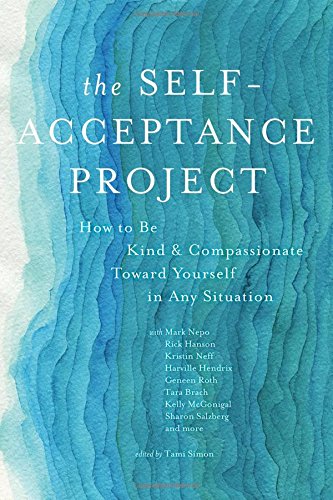
Even after years of spiritual practice, self-improvement, or therapy, many of us still have trouble with one essential challenge: self-acceptance. How do we stop from constantly judging ourselves as inadequate, finding fault with our bodies, or being plagued by our inner critics? The Self-Acceptance Project was created to help us find a solution. In this collection of essays, contemporary luminaries in spirituality, psychology, and creativity offer insights and teachings for truly embracing who we are no matter what our circumstances, including:
• “Waking Up from the Trance of Unworthiness”—Tara Brach illuminates the source of self-rejection and offers a powerful process to reverse unconscious patterns
• “Compassion for the Self-Critic”—Dr. Kristin Neff shows how self-judgment is often a misplaced but well-meaning survival instinct
• “Held, Not Healed”—Jeff Foster on making the space to accept anything that arises with open-hearted curiosity
• “No Strangers in the Heart”—poet Mark Nepo helps us reconnect to the sense of deep aliveness that we were born with
• “Taking in the Good”—Dr. Rick Hanson offers effective neuroscience-based insights and practices for overcoming our “negativity bias”
• “Transforming Self-Criticism into Self-Compassion”—Dr. Kelly McGonigal reveals practical strategies for changing the habitual way we treat ourselves
Why is it often so much easier to feel compassion and forgiveness toward others than toward ourselves? Where do our self-critical voices come from? Can we be motivated to grow and excel while still accepting ourselves as we are? In these 19 offerings, some of today’s most trusted teachers share their most valuable practices and techniques for building confidence, transforming our relationship with our inner critics, and using any circumstance as an opportunity to treat ourselves with kindness, compassion, and love.

Five Stars Great book!
Excellent in itself; wonderful as an introduction A marvelous anthology for readers who appreciate the connection between mental health and spiritual growth. The individual readings are valuable in and of themselves, offering a variety of perspectives. But they take on special value as introductions to each of the individual writers; I’ve subsequently read and found helpful the books of several simply because their contributions to “The Self-Acceptance Project” were so intriguing. Highly recommended!
It doesn’t get any better than this book – invaluable If I could recommend any book to anyone, it would be this book.